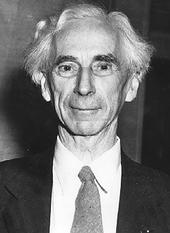any and all comments and SUGGESTIONS are welcome.
A Short Biography
Source
Bertrand Arthur William Russell was born at Trelleck on 18th May, 1872. His parents were Viscount Amberley and Katherine, daughter of 2nd Baron Stanley of Alderley. At the age of three he was left an orphan. His father had wished him to be brought up as an agnostic; to avoid this he was made a ward of Court, and brought up by his grandmother. Instead of being sent to school he was taught by governesses and tutors, and thus acquired a perfect knowledge of French and German. In 1890 he went into residence at Trinity College, Cambridge, and after being a very high Wrangler and obtaining a First Class with distinction in philosophy he was elected a fellow of his college in 1895. But he had already left Cambridge in the summer of 1894 and for some months was attaché at the British embassy at Paris.
In December 1894 he married Miss Alys Pearsall Smith. After spending some months in Berlin studying social democracy, they went to live near Haslemere, where he devoted his time to the study of philosophy. In 1900 he visited the Mathematical Congress at Paris. He was impressed with the ability of the Italian mathematician Peano and his pupils, and immediately studied Peano's works. In 1903 he wrote his first important book, The Principles of Mathematics, and with his friend Dr. Alfred Whitehead proceeded to develop and extend the mathematical logic of Peano and Frege. From time to time he abandoned philosophy for politics. In 1910 he was appointed lecturer at Trinity College. After the first World War broke out, he took an active part in the No Conscription fellowship and was fined £ 100 as the author of a leaflet criticizing a sentence of two years on a conscientious objector. His college deprived him of his lectureship in 1916. He was offered a post at Harvard university, but was refused a passport. He intended to give a course of lectures (afterwards published in America as Political Ideals, 1918) but was prevented by the military authorities. In 1918 he was sentenced to six months' imprisonment for a pacifistic article he had written in the Tribunal. His Introduction to Mathematical Philosophy (1919) was written in prison. His Analysis of Mind (1921) was the outcome of some lectures he gave in London, which were organized by a few friends who got up a subscription for the purpose.
In 1920 Russell had paid a short visit to Russia to study the conditions of Bolshevism on the spot. In the autumn of the same year he went to China to lecture on philosophy at the Peking university. On his return in Sept. 1921, having been divorced by his first wife, he married Miss Dora Black. They lived for six years in Chelsea during the winter months and spent the summers near Lands End. In 1927 he and his wife started a school for young children, which they carried on until 1932. He succeeded to the earldom in 1931. He was divorced by his second wife in 1935 and the following year married Patricia Helen Spence. In 1938 he went to the United States and during the next years taught at many of the country's leading universities. In 1940 he was involved in legal proceedings when his right to teach philosophy at the College of the City of New York was questioned because of his views on morality. When his appointment to the college faculty was cancelled, he accepted a five-year contract as a lecturer for the Barnes foundation, Merion, Pa., but the cancellation of this contract was announced in Jan. 1943 by Albert C. Barnes, director of the foundation.
Russell was elected a fellow of the Royal Society in 1908, and re-elected a fellow of Trinity College in 1944. He was awarded the Sylvester medal of the Royal Society, 1934, the de Morgan medal of the London Mathematical Society in the same year, the Nobel Prize for Literature, 1950.
In a paper "Logical Atomism" (Contemporary British Philosophy. Personal Statements, First series. Lond. 1924) Russell exposed his views on his philosophy, preceded by a few words on historical development.last updated: july 28, 2006
A Chronology
Source at Stanford Encyclopedia of Philosophy
* (1872) Born May 18 at Ravenscroft, Wales.
* (1874) Death of mother and sister.
* (1876) Death of father; Russell's grandfather, Lord John Russell (the former Prime Minister), and grandmother succeed in overturning his father's will to win custody of Russell and his brother.
* (1878) Death of grandfather; Russell's grandmother, Lady Russell, supervises his upbringing.
* (1890) Enters Trinity College, Cambridge.
* (1893) Awarded first class B.A. in Mathematics.
* (1894) Completed the Moral Sciences Tripos (Part II)
* (1894) Marries Alys Pearsall Smith.
* (1900) Meets Peano at International Congress in Paris.
* (1901) Discovers Russell's paradox.
* (1902) Corresponds with Frege.
* (1908) Elected Fellow of the Royal Society.
* (1916) Fined 110 pounds and dismissed from Trinity College as a result of anti-war protests.
* (1918) Imprisoned for five months as a result of anti-war protests.
* (1921) Divorce from Alys and marriage to Dora Black.
* (1927) Opens experimental school with Dora.
* (1931) Becomes the third Earl Russell upon the death of his brother.
* (1935) Divorce from Dora.
* (1936) Marriage to Patricia (Peter) Helen Spence.
* (1940) Appointment at City College New York revoked following public protests.
* (1943) Dismissed from Barnes Foundation in Pennsylvania.
* (1949) Awarded the Order of Merit.
* (1950) Awarded Nobel Prize for Literature.
* (1952) Divorce from Peter and marriage to Edith Finch.
* (1955) Releases Russell-Einstein Manifesto.
* (1957) Organizes the first Pugwash Conference.
* (1958) Becomes founding President of the Campaign for Nuclear Disarmament.
* (1961) Imprisoned for one week in connection with anti-nuclear protests.
* (1970) Dies February 02 at Penrhyndeudraeth, Wales.
